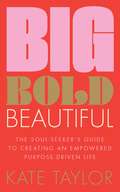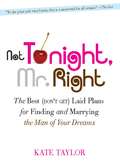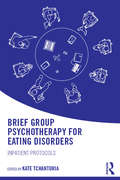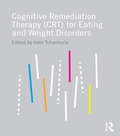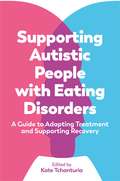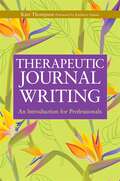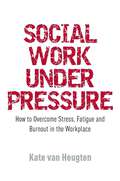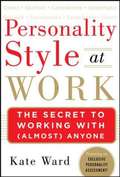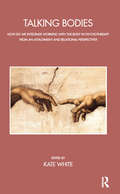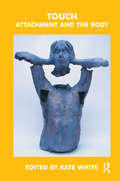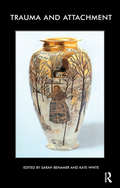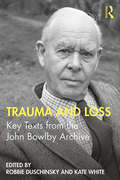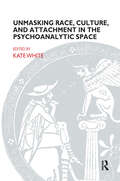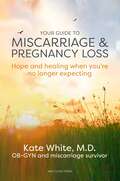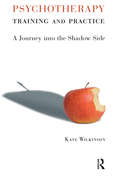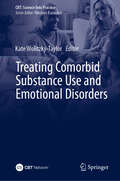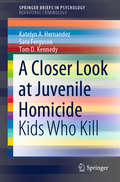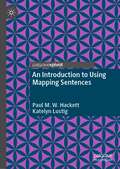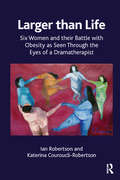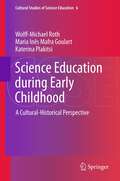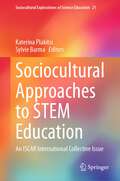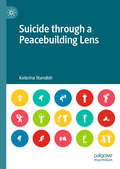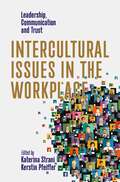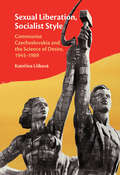- Table View
- List View
Big Bold Beautiful: The soul-seeker's guide to creating an empowered purpose-driven life
by Kate TaylorBig, Bold, Beautiful is the ultimate empowerment guide that takes you on a journey of discovery to connect to your authentic self, get your sparkle back and create a life where you can thrive – not just survive.Life design and empowerment coach Kate Taylor uses a unique mix of psychological tools and spiritual practices to form her Practical Magic coaching method. She blends straight-talking strategy with a dash of spiritual sauce to create an alchemy of measured action combined with a connection to something greater than us – where the true magic happens.Divided into seven steps, Kate brings you easy-to-implement practical tools sprinkled with a dash of woo, so that you can create the vibrant, powerful change you've been yearning for. Join Kate as she shows you how to embrace a melting pot of modalities. Try using SMART targets alongside pendulums to set goals; address your inner critic by challenging negative thought patterns and performing an elements release ritual on a Full Moon; or seek self-empowerment through rewiring limiting beliefs using NLP and tapping into the power of crystals.
Not Tonight, Mr. Right: The Best (Don't Get) Laid Plans for Finding and Marrying the Man of Your Dreams
by Kate TaylorWith the same saucy, tell-it-like-it-is appeal of He's Just Not That Into You, sex author Kate Taylor explains reasons to keep your clothes on in laugh-out-loud detail: how Oxytocin — the Fatal Attraction hormone — can make women up to ten times more emotionally attached after sex than men; why men never expect to get lucky on the third date, or any date; that relationships are more fun, easier and longer-lasting when you keep your feet on the ground instead of hooking them round his neck. An absolutely unique plan for making sure Mr. Right is more than Mr. Right Now: The Rules for how, why, and when not to have sex, this completely original take on an age-old concept offers: an Extreme Dating Makeover, a Q&A for skeptics, tactical plans, "questions to say yes to before you say yes to him," what to do on those third, fourth, tenth…dates when nookie isn't in the plan, and "I told you so" success stories, ultimately helping you to figure out the perfect time to have sex.
Brief Group Psychotherapy for Eating Disorders: Inpatient protocols
by Kate TchanturiaIn the treatment of Anorexia Nervosa, delivering psychological interventions in a group format can bring unique benefits in addition to those associated with working with patients individually. These include: sharing experiences and learning from others in a safe and therapeutic environment, becoming accustomed to being with other people and practising interpersonal skills. However, these aspects of group treatment also represent a challenge for group facilitators as it is exactly these interpersonal and relational demands that patients find difficult to tolerate. Facilitators are likely to be confronted with low motivation, or complete disengagement, as a result of the discomfort evoked by spending time in psychological groups. Nonetheless, once these difficulties are successfully overcome, the group setting can be effectively utilised to address the specific aims of a given psychological intervention, as well as tapping into these wider benefits Drawing upon research carried out by the Maudsley national inpatient eating disorders programme, Brief Group Psychotherapy for Eating Disorders brings together expert contributions in order to review the evidence base, as well as discussing how the challenges of the group setting can be overcome. This book outlines newly-developed protocols for group interventions aimed at providing brief but effective treatment for an increased numbers of patients, and addresses the need to develop and evaluate cost effective psychological interventions for patients with Anorexia Nervosa. Brief Group Psychotherapy for Eating Disorders is designed to offer therapists, clinicians, and researchers in the field a synopsis of the available evidence along with guidance on how to put theory into practice effectively. It will also be an invaluable resource for students, trainees and teachers in the clinical, counselling, psychology, psychiatry, nursing, occupational therapy and other allied professions.
Cognitive Remediation Therapy (CRT) for Eating and Weight Disorders
by Kate TchanturiaThe effective treatment of anorexia nervosa (AN) remains a significant challenge. This has prompted new research into ways of engaging and keeping patients in treatment and ultimately achieving better outcomes, not only on a symptomatic level but also in broader aspects of life. In this book Kate Tchanturia brings together international experts from the field of eating disorders to discuss the effectiveness of cognitive remediation therapy for treating anorexia nervosa, and keeping patients in therapy. Cognitive Remediation Therapy (CRT) is a type of therapy that concentrates on improving neurocognitive abilities such as attention, working memory, cognitive flexibility and planning, and executive functioning which leads to improved general functioning. Recent research has demonstrated the effectiveness of the approach for treating those with anorexia nervosa, cognitive improvements have been noted in patients, and the approach is associated with low drop-out rates from the treatment, and high levels of acceptability among both patients and therapists. This book presents research focussing on: - individual therapy with adults - family-based therapy - CRT with young people - group format of CRT - adapting interventions for people with co-morbidities - clinicians experiences working with CRT Illustrated throughout with case studies, and integrating neuropsychological testing and brain imaging this book discusses the latest research on this novel treatment approach. It will be key reading for researchers and academics in the eating disorders field wanting to trial the approach, as well as final year undergraduates and postgraduate clinical psychology students looking for a new perspective.
Supporting Autistic People with Eating Disorders: A Guide to Adapting Treatment and Supporting Recovery
by Kate TchanturiaThis book explores the link between autism and eating disorders through testimonies from practitioners, service users and carers. Combining research findings, case studies and first-hand accounts, it provides insights into how individuals on the autism spectrum can be supported towards full recovery from an eating disorder. Edited by the lead Clinical Psychologist at the Maudsley Eating Disorder National Service, informed by their team's research, chapters focus on the unique issues arising when autism and eating disorders coexist.The contributors suggest treatment adaptations from a multi-disciplinary perspective, and touch more broadly on the topic of poor mental health outcomes for autistic individuals, and how these might be improved.
Therapeutic Journal Writing: An Introduction for Professionals
by Kate Thompson Kathleen AdamsWriting a journal is not just about keeping a record of daily events - journal writing provides a unique therapeutic opportunity for facilitating healing and growth. The author of this book guides the reader through developing journal writing to use as a therapeutic tool. Keeping a journal can help the writer to develop a better understanding of themselves, their relationships and the world around them, as well as improve skills of problem-solving, decision-making and planning. As such, journal writing can be a powerful complement to verbal therapy, offering an effective and affordable way of extending support to troubled clients. The book includes advice on working with individuals, facilitating a therapeutic writing group, proposed clinical applications, practical techniques, useful journal prompts, exercises and case vignettes. This clear guide to the basics of journaling and its development as a therapeutic medium will be a valuable handbook for therapists, health and social care practitioners, teachers, life coaches, writing facilitators and any professional seeking personal development in themselves or their clients.
Social Work Under Pressure
by Kate Van HeugtenStress, fatigue and burnout are serious problems in the social work profession. High case loads, staff shortages, budget cuts and the challenging nature of the job contribute to high levels of stress, and social workers can crack under the pressure. This accessible book demonstrates how managers and practitioners can overcome workplace distress, fatigue and burnout by understanding the causes and implementing practical strategies. Part 1 outlines how stress, fatigue, burnout and trauma can be identified, how they impact upon social workers, and what strategies can help. Part 2 explores stress in particular settings, covering frontline practice, working with trauma, working with aggressive service users, bullying and violence in the workplace, and making mistakes. The book is rooted in the reality of everyday social work, incorporating the views and experiences of practising social workers. This book is full of techniques and tips that will be invaluable to all social work managers and practitioners seeking to beat workplace stress overload and burnout.
Personality Style at Work: The Secret to Working With (Almost) Anyone
by Kate WardMAKE EVERY WORKPLACE INTERACTION POSITIVE AND PRODUCTIVE Named a "Best Career Book 2012" by FINS Finance "Personality Style at Work provides you with the insight and tools to understand your style and to adapt it to others' preferences. Implement the concepts in this book to ensure that you will be a better communicator, team member, and leader. " --ELAINE BIECH, author of The Business of Consulting and editor of The ASTD Leadership Handbook "Kate has done a tremendous job using the Personality Style Model to help us each be the best we can be every day. " --LOU RUSSELL, CEO/Learning Facilitator, Russell Martin & Associates, and author of IT Leadership Alchemy, The Accelerated Learning Fieldbook, Project Management for Trainers, and 10 Steps to Successful Project Management "Personality Style at Work is a fresh and timely approach to the interplay of personality styles in the workplace. You may not need this book if you are a hermit, but it is a must-read for anyone working on a daily basis with other people!" --SHARON BOWMAN, international trainer and author of Training from the Back of the Room "Kate Ward presents a simple, useful model for looking at how personality style affects performance. A great fi nd for anyone interested in improving their everyday interactions. " --GEOFF BELLMAN, consultant and author of Extraordinary Groups: How Ordinary Teams Achieve Amazing Results About the Book: The most important business skill isn't a skill at all. It's your personality. And only when you develop a keen understanding of your personality style--and the styles of the people you deal with--will you reach your full potential as a business professional. Personality Style at Work reveals the proven personality style model used by HRDQ, a trusted developer of training materials--giving you one of today's most valuable tools for leading others, contributing to teams, effectively communicating with coworkers, and making better decisions. This groundbreaking guide helps you achieve positive results in virtually any workplace situation. Whether you're a high-level manager, a salesperson, a customer service professional, or an entry-level employee, you'll learn why others behave as they do in specifi c situations and how to use that knowledge to turn every interpersonal encounter into a win-win scenario. The HRDQ model has been administered to more than one million people--and it has generated remarkable results. It is based on four principal personality styles: Direct: High assertiveness, low expressiveness Spirited: High assertiveness, high expressiveness Considerate: Low assertiveness, high expressiveness Systematic: Low assertiveness, low expressiveness Which one describes you? Knowing the answer is the first step to achieving consistently positive and productive personal interactions--which is why Personality Style at Work includes an assessment that you can take to identify your style. Armed with this valuable self-assessment, you can adapt your behavior to create more practical, harmonious working relationships. Personality Style at Work opens the door to a whole new way of interacting with others in a way that benefits you, your coworkers, your customers, and your entire organization.
Talking Bodies: How do we Integrate Working with the Body in Psychotherapy from an Attachment and Relational Perspective? (The Bowlby Centre Monograph Series)
by Kate WhiteThis monograph brings together the presentations from the nineteenth John Bowlby Memorial Conference in 2012, organised by The Bowlby Centre. It explored the growing role of the body in relational psychotherapy over the last decade, and to bring us up to date in thinking about the relationship between attachment, the body and trauma. Questions addressed included: How do we anchor the new understandings we are gaining within the framework of attachment? How might the integration of these ideas about the body change what we do in the consulting room? What impact might this have on the therapy relationship? Can we maintain and respect the place of a secure, attuned attachment between therapist and client, and its healing potential, at the centre of our therapeutic work?
Touch: Attachment and the Body (The Bowlby Centre Monograph Series)
by Kate WhiteThis book compiles the papers presented at John Bowlby Memorial Conference 2003, exploring the complex and interwoven themes of touch, attachment and the body and their emergence in clinical work. It offers a new theory of the body, and of the role of the body in psychoanalytical practice.
Trauma and Attachment (The Bowlby Centre Monograph Series)
by Kate White Sarah BenamerThis monograph contains a rich variety of material that is not usually included in traditional writings on trauma. In addition to the theoretical and clinical perspectives, poetry and storytelling join in to weave a vivid tapestry of multifaceted approaches to trauma. Whilst remaining true to its theoretical base (which, of course, is Bowlby's attachment theory), the monograph succeeds in locating its subject matter in wider perspectives, thus enabling the reader to appreciate the complexity of contributing factors. It is not easy to compile a single publication out of a conference; yet, this monograph achieves its objective by offering a coherent treatment of trauma that also includes some up-to-date approaches and innovations. The papers are written with authority, clarity and sensitivity and will provide the reader with a most beneficial elaboration of trauma from an attachment theory perspective.
Trauma and Loss: Key Texts from the John Bowlby Archive
by Kate White Robbie DuschinskyDuring his lifetime John Bowlby, the founder of attachment theory, was unable to publish as he wished due to strong opposition to his ideas. Now, with the support of the Bowlby family, several complete and near-complete works from the John Bowlby Archive at the Wellcome Collection are published for the first time. The collection spans Bowlby’s thinking from his early ideas to later reflections, and is split into four parts. Part 1 includes essays on the topic of loss, mourning and depression, outlining his thoughts on the role of defence mechanisms. Part 2 covers Bowlby’s ideas around anxiety, guilt and identification, including reflections on his observations of and work with evacuated children. Part 3 features three seminars on the subject of conflict, in which Bowlby relates clinical concepts to both political philosophy and psychoanalysis in innovative ways. Part 4 consists of Bowlby’s later reflections on trauma and loss, and on his own work as a therapist. This remarkable collection not only clarifies Bowlby’s relationship with psychoanalysis but features his elaboration of key concepts in attachment theory and important moments of self-criticism. It will be essential reading for clinicians, researchers, and others interested in human development, relationships and adversity.
Unmasking Race, Culture, and Attachment in the Psychoanalytic Space (The Bowlby Centre Monograph Series)
by Kate WhiteDrawn from the John Bowlby Memorial Conference, the theme of this book addresses the often hidden and ignored subject of attachment, race and culture. Can our individual narratives in relation to race, culture and attachment be unmasked in the therapeutic dyad to reveal our human connectedness? The contributors explore how the conscious and unconscious meanings of therapists' and clients' racial and cultural identities shape the dialogue between them. How this emerges for both therapist and client in their work together is illustrated in clinical accounts.
Unmasking Race, Culture, and Attachment in the Psychoanalytic Space: Unmasking Race, Culture, And Attachment In The Psychoanalytic Space (The Bowlby Centre Monograph Series)
by Kate WhiteDrawn from the John Bowlby Memorial Conference, the theme of this book addresses the often hidden and ignored subject of attachment, race and culture. Can our individual narratives in relation to race, culture and attachment be unmasked in the therapeutic dyad to reveal our human connectedness? The contributors explore how the conscious and unconscious meanings of therapists' and clients' racial and cultural identities shape the dialogue between them. How this emerges for both therapist and client in their work together is illustrated in clinical accounts.
Your Guide to Miscarriage and Pregnancy Loss: Hope and Healing When You’re No Longer Expecting
by Kate WhiteMiscarriage affects almost 1 million women in the United States every year. Yet each woman experiencing a pregnancy loss often feels alone and full of questions about the process and the aftermath. And today&’s health care system is simply not designed to shepherd a woman and her family through the loss with the information and understanding they need. A woman needs an experienced hand to help guide her through one of the most painful experiences of her life. Having experienced two miscarriages of her own, Dr. Kate&’s provides women and their families with the two things sorely missing from their experience: detailed answers to their questions about miscarriage, and support and guidance through the healing process. Your Guide to Miscarriage and Pregnancy Loss; Hope and healing when you&’re no longer expecting takes a woman through the journey of miscarriage diagnosis and treatment. It addresses all types of pregnancy loss—like ectopic and molar pregnancies, as well as ones that are often overlooked by the media and other books. Filled with accessible information, frequently asked questions and answers, and methods for coping with grief, the book empowers women undergoing pregnancy loss to take control over their experience. Written from the perspective of a medical professional who has cared for women having miscarriages for more than 20 years and a woman who has experienced two miscarriages herself, Dr. Kate&’s Your Guide to Miscarriage and Pregnancy Loss; Hope and healing when you&’re no longer expecting is an earnest conversation between doctor and reader that provides compassion and guidance, as well as hope for a woman&’s future pregnancy efforts.
Psychotherapy Training and Practice: A Journey into the Shadow Side
by Kate WilkinsonAn exploration of the extensive intra-personal, interpersonal and group dynamic landscape of human experience pertinent to the understanding of the human shadow in the training of psychotherapists. Using phenomenological enquiry this book invites unique, in-depth experiences, provides new insights and addresses the complexities and diversities inherent in the emergence and containment of shadow experience in psychotherapy training. This book takes the reader through a process of qualitative research and invites the reader to explore his or her own relationships to the love of others, through the exploration of all the things that love is not. It argues that without hate we cannot truly love. Interspersed throughout the book are suggestions for personal exploration and it is hoped that reading this book will both stimulate practitioners to a process of self-reflection and questioning, and also support practitioner researchers in their own journey to self-understanding.
Treating Comorbid Substance Use and Emotional Disorders (CBT: Science Into Practice)
by Kate Wolitzky-TaylorThis book highlights the prevalence of emotional disorder and substance use disorder comorbidity and effective approaches to managing these co-existing problems. As substance use disorder is twice as likely to co-exist with an anxiety disorder, and three times as likely to co-occur with a mood disorder, treatment is a complicated challenge. This book describes cutting-edge clinical research paired with data-driven treatment guidelines, providing an integrated approach to treatment that targets both issues to improve clinical outcomes. This book outlines how fully integrated treatment for these common comorbidities can address barriers and reduce symptoms more effectively than simply addressing substance use disorder. It is an invaluable resource for clinicians and researchers alike.
A Closer Look at Juvenile Homicide: Kids Who Kill (SpringerBriefs in Psychology)
by Sara Ferguson Katelyn A. Hernandez Tom D. KennedyThis book focuses on the small but disturbing percentage of homicides by children that occur each year, providing a brief overview of the legal, individual, and social aspects of this phenomenon. Since the 1980s, these crimes have been on the rise and the resulting legal response has been harsher punishments as well as treatment of children like adults. This has led to a host of failures in the juvenile justice system wherein recidivism is high and general outcome is low. The book reviews the literature on youth homicide, including gender, age, and race factors, as well as individual, familial, and environmental risks. The authors seek to aid in the identification and understanding of juvenile homicide to raise awareness of both a population that receives little formal psychological intervention and of the systemic deficiencies that affect these individuals as well as society itself. Exploring current theories, trends, and common factors in juvenile homicide, this brief aims to improve prevention, intervention, and reintegration of young offenders into the community.
An Introduction to Using Mapping Sentences
by Paul M. Hackett Katelyn LustigThis book acts as an introductory guide to understanding and using the mapping sentence as a tool in social science and humanities research. The book fills the need for a concise text that simply instructs how and when to use a mapping sentence and provides practical examples. Mapping sentences are a major research component and tool of facet theory. The book begins by covering the background to mapping sentence, including the philosophy and theory underpinning it. The following chapter discuss what mapping sentence is, what different kinds of mapping sentences exist, and knowing when and which to use it in a given situation. The book then moves into describing how to write a mapping sentence and how to analyse the information gained from mapping sentence research. It ends with a consideration of the future developments of mapping sentences and their applications across the social sciences and humanities, including in particular psychology, marketing, behavioural biology, art and health.
Larger than Life: Six Women and their Battle with Obesity as seen through the Eyes of a Dramatherapist
by Katerina Couroucli-RobertsonLarger than Life is aimed at anyone interested in obesity and its treatment. It follows a dramatherapy group attended by six women, all struggling with their weight, using vignettes, transcriptions of the sessions attended, and commentary on the progress made by the participants. A final interview concludes each of the women's therapy, where they talk about their experiences within the group, followed by the therapist's summation of their treatment. The book concludes with brief telephone conversations with all six women three years after their treatment ended, giving a clear picture of the value of dramatherapy to the individual. As well as looking at these specific case studies, the authors also discuss the causes and effects of obesity, the dramatherapy group process, and why dramatherapy is an effective means of treating eating disorders. This is a must-read book for anyone interested in the subject of obesity or dramatherapy.
Science Education during Early Childhood
by Wolff-Michael Roth Maria Ines Mafra Goulart Katerina PlakitsiChildren's learning and understanding of science during their pre-school years has been a neglected topic in the education literature--something this volume aims to redress. Paradigmatic notions of science education, with their focus on biologically governed development and age-specific accession to scientific concepts, have perpetuated this state of affairs. This book offers a very different perspective, however. It has its roots in the work of cultural-historical activity theorists, who, since Vygotsky, have assumed that any higher cognitive function existed in and as a social relation first. Accepting this precept removes any lower limit we may deem appropriate on children's cognitive engagement with science-related concepts. The authors describe and analyze the ways in which children aged from one to five grapple with scientific concepts, and also suggest ways in which pre-service and in-service teachers can be prepared to teach in ways that support children's development in cultural and historical contexts. In doing so, the book affirms the value of cultural-historical activity theory as an appropriate framework for analyzing preschool children's participation in science learning experiences, and shows that that the theory provides an appropriate framework for understanding learning, as well as for planning and conducting training for pre-school teachers.
Sociocultural Approaches to STEM Education: An ISCAR International Collective Issue (Sociocultural Explorations of Science Education #21)
by Katerina Plakitsi Sylvie BarmaThis book is a contribution to the sociocultural approaches to Science Technology Engineering and Mathematics (STEM) Education. It offers a new interpreting theoretical framework coming from the Cultural Historical Psychology. The authors highlight some serious elements of the sociocultural context that mediates learning on STEM or with STEM adds. The book brings together the work of researchers interested in developmental psychology and childhood, with a special focus on using Activity theory and Cultural-historical research approach to unite these two opposing approaches to the study of children. The authors reconsider our relationship and experiencing with technology. It moves the attention from the pure instrumental aspect of technology to a deep human and societal approach. Moreover, the book focuses on the issue of teachers' continuing education in both formal and informal settings is being seen under a sequential system of expansive cycles and the key role of contradictions in transformative educational settings. Overall, this book encourages the academic society to open dialogue with other societies and enhance interdisciplinary research in times of crisis.
Suicide through a Peacebuilding Lens
by Katerina StandishThis book, as the first exploration of suicide in Peace and Conflict Studies (PACS), illustrates the scarcity of suicide research in the discipline and argues that the leading cause of violent death worldwide is a multifaceted phenomenon that needs to be fully comprehended as a significant and often preventable form of world-wide violence. The author supplies a theoretical framework for assessing suicide as medical or instrumental, posits interdisciplinary complementarity and offers future lines of inquiry that challenge established notions of prevention. The book presents a PACS meta-theory termed ‘encounter theory’ and supplies a suicidal peacebuilding platform via relationship. This book questions why more PACS scholars aren’t turning their attention to suicide when more people die by suicide than ethnic, religious or ‘terroristic’ violence combined.
Intercultural Issues in the Workplace: Leadership, Communication and Trust
by Katerina Strani Kerstin PfeifferThis textbook addresses key issues and challenges in contemporary multicultural and multilingual workplaces through the lens of leadership, communication and trust. It draws together contributions from fields including cultural studies, psychology, sociolinguistics, translation and interpreting studies, and business management, making a valuable contribution to the area of language and culture in the workplace. The volume is divided into 5 thematic sections: Intercultural Communication; Cross-cultural Leadership; Economy; Language; and Diversity. It offers a critical analysis on themes that tend to be overlooked in intercultural business and management scholarship, such as multilingualism in the workplace, translation and interpreting in cross-cultural work practices, dignity in the workplace, performing gender in the workplace, and D/deaf people in the workplace. It also revisits themes such as cross-cultural leadership, interculturality and the embedded economy, and managing uncertainty in the context of the contemporary globalized workplace. It then brings everything together in a Cross-Cultural Scenarios chapter at the end, with recommendations for every scenario. Overall, the textbook constitutes an essential resource for honours undergraduate and postgraduate students in these and related fields, as well as academics and practitioners with an interest in globalised workplaces.
Sexual Liberation, Socialist Style: Communist Czechoslovakia and the Science of Desire, 1945–1989
by Kateřina LiškováThis is the first account of sexual liberation in Eastern Europe during the Cold War. Kateřina Lišková reveals how, in the case of Czechoslovakia, important aspects of sexuality were already liberated during the 1950s – abortion was legalized, homosexuality decriminalized, the female orgasm came into experts’ focus – and all that was underscored by an emphasis on gender equality. However, with the coming of Normalization, gender discourses reversed and women were to aspire to be caring mothers and docile wives. Good sex was to cement a lasting marriage and family. In contrast to the usual Western accounts highlighting the importance of social movements to sexual and gender freedom, here we discover, through the analysis of rich archival sources covering forty years of state socialism in Czechoslovakia, how experts, including sexologists, demographers and psychologists, advised the state on population development, marriage and the family to shape the most intimate aspects of people’s lives.
